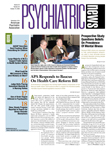A 13-item practice parameter on the use of psychotropic medication in children and adolescents has been issued by the American Academy of Child and Adolescent Psychiatry (AACAP).
The best practices, published as an article in the September Journal of the American Academy of Child and Adolescent Psychiatry, were developed by the AACAP Work Group on Quality Issues. The lead author was John Walkup, M.D.
“The reason for the parameter was to ground prescribers of psychotropic medication in the best-practice principles,” Walkup said in a statement released with the article. “This is not a standard-of-care document and is not meant to reduce prescribing. Rather, it is a call for action to create a systematic and comprehensive approach to using medications in children safely and effectively.”
The parameter outlines best practices for psychiatric and other medical assessment, development of the treatment and monitoring plan, education of the patient and family about the disorder and treatment, implementation of the treatment plan, and management of medication-modification plans.
The parameter has 13 principles:
•
Before initiating pharmacotherapy, a psychiatric evaluation is completed.
•
Before initiating pharmacotherapy, a medical history is obtained, and a medical evaluation is considered when appropriate.
•
The prescriber is advised to communicate with other professionals involved with the child to obtain collateral history and set the stage for monitoring outcome and side effects during the medication trial.
•
The prescriber develops a psychosocial and psychopharmacological treatment plan based on the best available evidence.
•
The prescriber develops a plan to monitor the patient, short and long term.
•
Prescribers should be cautious when implementing a treatment plan that cannot be appropriately monitored.
•
The prescriber provides feedback about the diagnosis and educates the patient and family regarding the child's disorder and the treatment and monitoring plan.
•
Prescribers complete and document the assent of the child and consent of the parents before initiating medication treatment and at important points during treatment.
•
The assent and consent discussion focuses on the risks and benefits of the proposed and alternative treatments.
•
The prescribers implement medication trials using an adequate dose and for an adequate duration of treatment.
•
The prescriber reassesses the patient if the child does not respond to the initial medication trial as expected.
•
The prescriber needs a clear rationale for using medication combinations.
•
Discontinuing medication in children requires a specific plan.
An abstract of the practice parameter is posted at<www.jaacap.com>.▪
